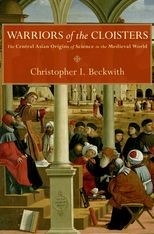Warriors of the Cloisters: The Central Asian Origins of Science in the Medieval World
Warriors of the Cloisters: The Central Asian Origins of Science in the Medieval World
Cite
Abstract
This book tells how key cultural innovations from Central Asia revolutionized medieval Europe and gave rise to the culture of science in the West. Medieval scholars rarely performed scientific experiments, but instead contested issues in natural science, philosophy, and theology using the recursive argument method. This highly distinctive and unusual method of disputation was a core feature of medieval science, the predecessor of modern science. We know that the foundations of science were imported to Western Europe from the Islamic world, but until now the origins of such key elements of Islamic culture have been a mystery. This book traces how the recursive argument method was first developed by Buddhist scholars and was spread by them throughout ancient Central Asia. It shows how the method was adopted by Islamic Central Asian natural philosophers—most importantly by Avicenna, one of the most brilliant of all medieval thinkers—and transmitted to the West when Avicenna's works were translated into Latin in Spain in the twelfth century by the Jewish philosopher Ibn Da'ud and others. During the same period the institution of the college was also borrowed from the Islamic world. The college was where most of the disputations were held, and became the most important component of medieval Europe's newly formed universities. As the book demonstrates, the Islamic college also originated in Buddhist Central Asia. Using in-depth analysis of ancient Buddhist, Classical Arabic, and Medieval Latin writings, this book will help to transform our understanding of the origins of medieval scientific culture.
-
Front Matter
-
One
Introduction
-
Two
The Recursive Argument Method of Medieval Science
- Three From College and Universitas to University
-
Four
Buddhist Central Asian Invention of the Method
-
Five
Islamization in Classical Arabic Central Asia
-
Six
Transmission to Medieval Western Europe
-
Seven
India, Tibet, China, Byzantium, and Other Control Cases
-
Eight
Conclusion
-
End Matter
Sign in
Personal account
- Sign in with email/username & password
- Get email alerts
- Save searches
- Purchase content
- Activate your purchase/trial code
Institutional access
-
Sign in through your institution
- Sign in with a library card Sign in with username/password Recommend to your librarian
Institutional account management
Sign in as administratorPurchase
Our books are available by subscription or purchase to libraries and institutions.
Purchasing information| Month: | Total Views: |
|---|---|
| February 2023 | 2 |
| February 2023 | 3 |
| February 2023 | 3 |
| August 2023 | 2 |
| August 2023 | 1 |
| August 2023 | 1 |
| September 2023 | 1 |
| September 2023 | 3 |
| February 2024 | 1 |
| February 2024 | 4 |
| February 2024 | 2 |
| February 2024 | 1 |
| February 2024 | 6 |
| February 2024 | 2 |
| February 2024 | 2 |
| April 2024 | 1 |
| April 2024 | 1 |
| April 2024 | 2 |



Get help with access
Institutional access
Access to content on Oxford Academic is often provided through institutional subscriptions and purchases. If you are a member of an institution with an active account, you may be able to access content in one of the following ways:
IP based access
Typically, access is provided across an institutional network to a range of IP addresses. This authentication occurs automatically, and it is not possible to sign out of an IP authenticated account.
Sign in through your institution
Choose this option to get remote access when outside your institution. Shibboleth/Open Athens technology is used to provide single sign-on between your institution’s website and Oxford Academic.
If your institution is not listed or you cannot sign in to your institution’s website, please contact your librarian or administrator.
Sign in with a library card
Enter your library card number to sign in. If you cannot sign in, please contact your librarian.
Society Members
Society member access to a journal is achieved in one of the following ways:
Sign in through society site
Many societies offer single sign-on between the society website and Oxford Academic. If you see ‘Sign in through society site’ in the sign in pane within a journal:
If you do not have a society account or have forgotten your username or password, please contact your society.
Sign in using a personal account
Some societies use Oxford Academic personal accounts to provide access to their members. See below.
Personal account
A personal account can be used to get email alerts, save searches, purchase content, and activate subscriptions.
Some societies use Oxford Academic personal accounts to provide access to their members.
Viewing your signed in accounts
Click the account icon in the top right to:
Signed in but can't access content
Oxford Academic is home to a wide variety of products. The institutional subscription may not cover the content that you are trying to access. If you believe you should have access to that content, please contact your librarian.
Institutional account management
For librarians and administrators, your personal account also provides access to institutional account management. Here you will find options to view and activate subscriptions, manage institutional settings and access options, access usage statistics, and more.